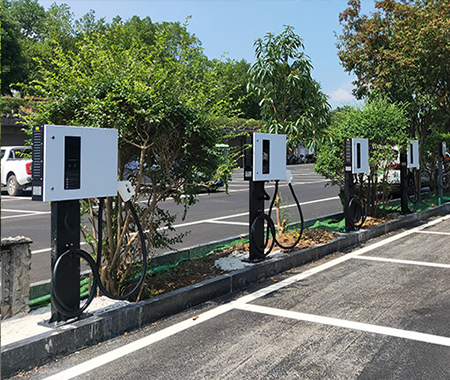Empowering Electric Mobility: The 50kW EV Charger
The rise of electric vehicles (EVs) marks a revolutionary era in the automotive sector, signaling a shift towards eco-friendly and sustainable transportation. At the heart of this transition lies the imperative need for robust EV charging infrastructure, a linchpin in driving the widespread adoption of EVs and alleviating the prevalent concern of range anxiety, a deterrent to many potential EV owners.
Within the realm of EV chargers, the 50kW EV charger emerges as a remarkable solution. With its remarkable charging capacity, this charger significantly accelerates the charging process, substantially reducing the time required for EV recharging. This technological advancement represents a pivotal milestone in enhancing the practicality and convenience of EVs, rendering them more accessible for daily use.
What are EV Chargers
A fundamental component of the electric vehicle (EV) landscape is comprehending the basics of EV charging. EVs rely on electricity as their power source, and the process of charging entails the transfer of electrical energy from a power supply to the EV’s battery.
Different Types of Chargers
Various charger types cater to distinct charging requirements:
- Level 1 Chargers: These are fundamental chargers utilizing standard household outlets (120 volts) to provide a slower charging rate. Typically included with most EVs, they are apt for overnight charging at home.
- Level 2 Chargers: Level 2 chargers employ higher voltage (typically 240 volts), delivering faster charging compared to Level 1. Predominantly found at public charging stations, they suit residential and commercial settings.
- DC Fast Chargers: Representing the fastest charging option, DC fast chargers supply direct current (DC) directly to the vehicle’s battery, sidestepping the onboard charger for rapid replenishment. Available in varying power levels, the 50kW charger stands as a mid-tier choice among them.
Focus On the 50kW Charger
A subtype of DC fast charger with a 50-kilowatt power output, the 50kW charger offers considerably swifter charging than Level 2 alternatives. Suited for scenarios demanding rapid top-ups, such as highway rest stops and commercial charging hubs, it strikes a balance between charging speed and infrastructure cost, rendering it a pragmatic selection for many EV users. Particularly well-suited for mid-range EVs, it efficiently curtails charging times during journeys.
Benefits of the 50kW EV Charger
The 50kW EV charger brings forth a multitude of advantages:
Accelerated Charging
In contrast to Level 1 and Level 2 chargers, the 50kW charger substantially expedites the charging process. This translates into swift recharges for EV owners, enhancing convenience, especially for those with busy lifestyles.
Cost-Effective Speed
While not as costly as ultra-fast chargers, the 50kW charger offers a significant boost in charging speed. Striking an equilibrium between swiftness and infrastructure expenditure, it represents a financially sensible choice for businesses and communities aiming to bolster their EV charging networks.
Versatility
The 50kW charger demonstrates remarkable adaptability and suits diverse locations. Its deployment in urban settings caters to the need for quick, everyday top-ups during daily commutes. Simultaneously, its presence in intercity locales supports long-distance EV travel, effectively reducing range anxiety for EV owners on extended journeys.
Battery Preservation
Unlike ultra-fast chargers, notorious for exerting excessive stress on EV batteries due to their high power outputs, the 50kW charger adopts a more moderate charging rate. This gentle approach minimizes wear and tear on the EV’s battery over time, potentially extending its operational lifespan and safeguarding overall battery health.

Challenges in Implementing 50kW EV Chargers
Rolling out the 50kW EV charger entails grappling with several key implementation hurdles:
Infrastructure Demands
Supporting the heightened power output of 50kW chargers necessitates upgraded grid connections and electrical installations. This undertaking often incurs significant costs and entails intricate coordination with utility providers.
Cost Considerations
The initial setup expenses associated with 50kW chargers can be substantial. Moreover, ongoing maintenance and upkeep are imperative to ensure the reliability and safety of the charging infrastructure. These financial commitments can pose barriers to widespread adoption.
Spatial Constraints
50kW chargers tend to occupy a larger physical footprint compared to Level 1 and Level 2 chargers. Identifying suitable installation sites, particularly in space-constrained urban areas, presents a logistical challenge.
Demand Dynamics
Guaranteeing a robust user base that justifies 50kW charger installations is pivotal. Without a consistent influx of EV users seeking expedited charging, the investments in this infrastructure may fall short of anticipated returns. Thus, meticulous planning and market analysis are imperative.
Mitigating these challenges demands a collaborative endeavor among various stakeholders, including government bodies, utility companies, and private enterprises. Their joint efforts should focus on crafting cost-effective solutions that facilitate the expansion of 50kW EV charging infrastructure, all while catering to the mounting demand for electric vehicle charging services.
The Future Role of 50kW EV Chargers in the EV Ecosystem
In the evolving landscape of electric vehicle (EV) infrastructure, 50kW EV chargers are poised to assume pivotal roles:
Urban Charging Networks
These chargers will remain fundamental elements of urban charging networks. Their moderate charging speed aligns perfectly with the requirements of city-dwelling EV owners seeking convenient, dependable charging for their daily commutes and local errands.
Bridge Solution
As the EV sector continues to progress, 50kW chargers will serve as an effective bridge solution. They deliver faster charging compared to Level 2 chargers while remaining more cost-effective to install and maintain than ultra-fast chargers. This positions them as a practical choice until higher-capacity chargers become more prevalent and economically accessible.
Complementing Ultra-Fast Chargers
50kW chargers will complement ultra-fast chargers by plugging gaps in the charging infrastructure. While ultra-fast chargers cater primarily to long-distance travel, 50kW chargers provide essential charging options in urban and suburban areas, augmenting the overall accessibility and convenience of EV ownership.
CONCLUSION
As we strive relentlessly toward a future of sustainable and electrified transportation, the 50kW EV charger stands out as a symbol of progress and practicality. With the growing prevalence of electric vehicles (EVs), these chargers have cemented their position as essential elements within the EV ecosystem, ready to influence the dynamics of how we navigate and power our vehicles.

